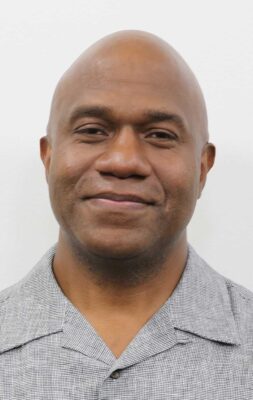Learn About a Lecturer: Plato Smith Introduces Students to Data Management

Lecturer: Plato Smith
Location: University of Florida, Gainesville
Education: MLIS, North Carolina Central University; PhD, Florida State University
What do you teach at SIS?I teach INSC 590: Introduction to Data Management. This introductory course includes basic data management concepts and models within library information sciences that students need to know. The course leverages the DataOne education modules for teaching best practices. Four-invited guest (e.g. data librarian, informatics consultant, and scientist) from the profession speak to students in class. The students really enjoy invited guest speakers as speakers’ presentations connect concepts to real world projects. Speakers will often mention concepts covered in class whereby students understand more fully basic data management concepts through the projects of practitioners and a scientist.
What has it been like being an SIS lecturer?
SIS is welcoming. My experience with SIS exceeded expectations. The staff is responsive whereby tech support for Canvas is professional and very helpful. This SIS lecturer position is my first official teaching appointment. The students are ambitious, conscientious, intellectually curious, and responsible. Despite the COVID-19 pandemic this past semester, all students completed all projects without interruption. Students asked many questions for sustained engagement, guidance, and continuous education. The challenge for the course is to teach students who are new to data management while challenging the advanced students in the course. Through optional projects and bonuses that include Kaggle data science micro-courses or a library grant project proposal, both beginning and advanced students are taught without adversely impacting their learning experiences. The advanced students in the course interested in data sciences have the option of completing either Library Carpentry lessons or Kaggle data science micro-courses as part of curriculum.
What is your background in information sciences?
I was appointed as the first tenured-track faculty data management librarian currently at the University of Florida (UF) in 2016. I currently lead the Data Management and Curation Working Group (DMCWG) at UF, assist researchers with data management planning, conduct training workshops, and assist in university-wide socio-technical data management at UF.
Prior to joining UF in 2016, I was a 2014-2016 CLIR/DLF postdoc fellow in data curation at the University of New Mexico (UNM) in Albuquerque. While at UNM, my major outcomes included Emerald publication of Digital Library Perspective (2016 Outstanding Paper), being chair of the EarthCube Technology and Architecture Committee (TAC) Gap Analysis Working Group, receiving the EarthCube 2015 Community Service Award, and being an NMEPSCOR Postdoc Leadership Workshop participant. The 2016 paper was a direct result of a survey asking EarthCube scientists about some of the output from their funded research, how they are making outputs, and prototypes available. EarthCube is a National Science Foundation funded research project.
Prior to joining UNM in 2014, I was department head for the Florida State University (FSU) Libraries’ Digital Library from 2005–2012, where I developed, populated, and managed digital collections in the FSU Libraries’ digital content management system, DigiNole Repository, and electronic theses and dissertations institutional repository.
All of my professional work experiences prepared me to teach at SIS. However, the catalyst that facilitated the SIS Lecturer opportunity was the 2018 Oak Ridge Associated University (ORAU) Faculty Travel Grant that enabled me to travel to another institution affiliated with ORAU, which was the University of Tennessee, Knoxville. I contacted the data curation librarian, Chris Eaker, at UT Libraries, who orchestrated connection with the Oak Ridge Distributed Active Archives Center (DAAC) and SIS. That resulted in a two-day visit to both organizations. Chris organized a meeting with ORNL DAAC Chief Scientist Alison Boyer, and SIS Director Diane Kelly, and with SIS faculty. An outcome from the meeting with Diane Kelly was the invitation for an opportunity to develop a new graduate course in data management for spring 2019.
How did you get interested in information sciences?
I often worked a part-time job in the library as an undergraduate but never imagined a career as a librarian. I became an assistant manager at Sherwin-Williams after completing an undergraduate degree in business administration. However, after a few years in retail management, I made a career change to pursue graduate degrees in library and information sciences.
Due to my innate ability to connect with people, a willingness to share information and encourage others, the LIS profession has evolved from a part-time job to a profession.